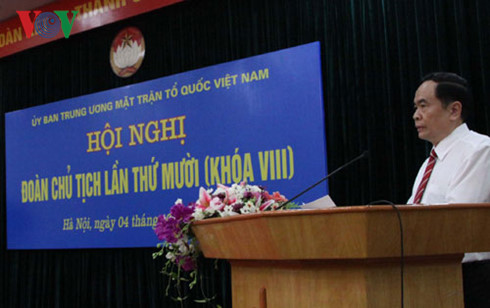Why is the work of supervision and criticism still 'stuck'?
Supervisory and critical recommendations sent to relevant agencies often go unanswered due to the lack of a specific mechanism for response responsibility.
The current Law on the Vietnam Fatherland Front was passed by the National Assembly on June 9, 2015 and took effect from January 1, 2016. The Law has great political significance, serving as a basis for the Vietnam Fatherland Front to more effectively carry out its responsibilities and rights, including the task of social supervision and criticism.
The supervision and social criticism work of the Vietnam Fatherland Front plays an important role, contributing to the implementation of democracy, building a state of the people, by the people and for the people. Before the 2013 Constitution, the supervision activities of the Vietnam Fatherland Front were stipulated in many legal documents and based on most areas of State management, but in reality, there were only framework regulations, principles on the supervisory role of the Vietnam Fatherland Front without specific regulations on the mechanism, especially on the methods and ways of implementation.
Regarding social criticism activities, Article 9 of the 2013 Constitution officially recognizes for the first time the social criticism task of the Vietnam Fatherland Front. This is an important legal basis for the implementation of the responsibilities and rights of the Vietnam Fatherland Front system.
 |
| Mr. Tran Thanh Man, Vice Chairman-General Secretary of the Central Committee of the Vietnam Fatherland Front |
However, the supervision and social criticism work of the Vietnam Fatherland Front still has limitations such as unclear methods and implementation processes, especially coordination mechanisms. The mechanisms and sanctions on legal responsibilities of the supervised subjects, the drafters of social criticism documents and related agencies and organizations are unclear and not strong enough. The participation and involvement of local authorities are unclear.
Awareness of the Front's supervision and criticism in some places is still inadequate. Mr. Tran Thanh Man, Vice Chairman and General Secretary of the Central Committee of the Vietnam Fatherland Front, said that after 2 years of implementing the Regulations on social supervision and criticism of the Vietnam Fatherland Front and socio-political organizations and related regulations, the Fatherland Front at all levels has actively and proactively implemented social supervision and criticism activities, contributing to enhancing the position and role of the Vietnam Fatherland Front in participating in Party and government building; representing and protecting the legitimate rights and interests of the people.
“The recommendations for supervision and social criticism sent by the Vietnam Fatherland Front and its members to relevant agencies do not have a specific mechanism for responsibility for responding. Whether these agencies accept them or not, how they accept them, and to what extent, the agency sending the recommendations does not know. For that reason, despite many efforts, the supervision work of the Vietnam Fatherland Front has not been very effective, and the results have not been as expected,” Mr. Tran Thanh Man emphasized.
According to Mr. Tran Thanh Man, up to now, the Law on the Vietnam Fatherland Front has dedicated 2 chapters to regulate the supervision and social criticism of the Vietnam Fatherland Front. However, in order for these regulations to be implemented in practice, it is necessary to continue to fully specify a number of articles of the law, clarifying the methods of implementing the supervision and social criticism activities of the Vietnam Fatherland Front. Therefore, it is very necessary to develop a joint resolution detailing the forms of supervision and social criticism./.
According to VOV
